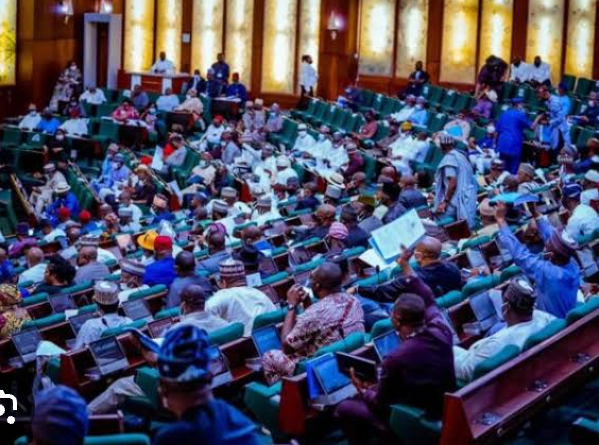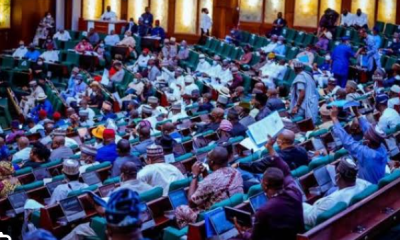News
Reps urge FG to release full capital allocation to intelligence agencies

By Francesca Hangeior
The House of Representatives Committee on National Security and Intelligence has urged the Federal Government to ensure that the total capital allocation, as contained in both the 2024 budget and the 2025 budget estimates, is released to the security agencies.
According to the committee, this will enable the nation’s security agencies to deliver on their constitutional mandate efficiently.
Speaking during Monday’s 2025 budget defence by agencies under the purview of the Office of the National Security Adviser, the Chairman, House Committee on National Security and Intelligence, Ahmed Satomi, said it is regrettable that capital allocation to some of the intelligence agencies in 2024 has not been released, while releases to others fell below expectations.
The Borno lawmaker stated that though allocation to the security sector has improved over the years; the intelligence sub-sector, he noted, has always been underfunded, making it difficult to attain peak service delivery.
Present at the defence session were representatives of the Office of the National Security Adviser, Directorate of State Services, National Intelligence Agency and the Presidential Air Fleets.
Others were the National Centre for the Control of Small Arms and Light Weapons, National Institute for Security Studies, National Counter Terrorism Centre and the National Cybercrimes Coordination Centre.
Satomi called on the various agencies to work together to ensure the safety of Nigerians and their properties, assuring that the committee will carry out its oversight duty in the interest of Nigerians.
Lauding President Bola Tinubu for allocating N4. 91tn to Defence and Security; the All Progressives Congress lawmaker highlighted the significance of prioritising the intelligence sub-sector in terms of capital allocation in the 2025 fiscal year.
He noted that the intelligence sub-unit was allocated N595bn, with a proposed capital expenditure allocation of N274.55bn, overhead allocation of N107.96bn and personnel allocation of N212.51bn.
He said, “I am calling on the President of the Federal Republic of Nigeria, Bola Tinubu, to please intervene not just for an increase in the allocations to the agencies in the intelligence sector but to also direct the Minister of Finance to, as a matter of national security, prioritise the full release of all outstanding 2024 budget allocations to the intelligence agencies and sustain the practice of prompt releases to them going forward.
“It is imperative to note that the 2025 budget (proposal) is christened the ‘Budget of restoration: Securing peace, rebuilding prosperity.’
“Securing peace presupposes that a lot of engagements with citizens will be undertaken by the government at all levels.”
He added, “Deradicalisation, disarmament, rehabilitation and reintegration programmes etc, will have to be carried out as a major non-kinetic initiative by the Federal Government of Nigeria in collaboration with other tiers of government.
“It is therefore not encouraging to observe that the frontline agencies saddled with statutory responsibilities of countering violent extremism, terrorism, ‘illicit flow of small arms and light weapons, intelligence gathering and analysis, maintenance of national security and ensuring the provision of safe, secure and efficient air transportation for the President, Vice President and other notable government officials are negligibly funded.
“Going by the submissions before the committee, it is heartbreaking that an agency like the National Centre for Counter-Terrorism has not gotten any capital release for the year 2023 and year 2024.”
Earlier in his remarks, the Permanent Secretary, Special Services in the Office of the National Security Adviser, Mohammed Danjuma, said the proposed 2025 budget is aimed at tackling evolving security threats facing the nation.
He added that the Tinubu-led government is committed to empowering the security agencies to gather intelligence seamlessly, among other functions.
News
BUNKERING: Army, Tantita Security Arrest Truck Laden with Illegally Extracted Crude Oil in Delta

A joint team comprising officers of the 181 Battalion, Nigerian Army, Oleh, and personnel from Tantita Security Services Nigeria Ltd. has arrested a vacuum truck involved in illegal crude oil extraction at Well 3, Olomoro, in Isoko South Local Government Area of Delta State.
According to reports, the truck, which previously belonged to Engr. Daniel Omoyibo, also known as Damotech, was gifted to the driver, Mr. Matthew Ojomikre, who is currently being detained at the Forward Operating Base (FOB), 181 Battalion, Oleh.
Upon interrogation, the driver confessed that his company had been contracted by Heritage Energy Operational Services Ltd. to evacuate sludge from Well 3, Olomoro. However, he was unable to provide any formal approvals or documentation authorizing the activity, as was previously the norm.
Until recently, Heritage Energy Operational Services Ltd. had consistently provided crude and condensate trucking permits to officers of the Nigerian Army and Tantita Security Services Nigeria Ltd. for proper monitoring from the loading point to the discharge location.
Officers of Tantita Security Services, in collaboration with a team from Heritage and the Nigerian Army, have collected samples from the vacuum truck for laboratory testing and analysis.
The preliminary confessional statement from the driver indicates that he illegally collected crude oil from Well 3 under the pretense of evacuating sludge from the wellheads.
Authorities have reported that the same truck has previously been involved in unauthorized crude oil evacuations within the Isoko axis.
The driver, the truck, and its contents remain in custody at the 181 Battalion Base in Oleh for further interrogation and possible prosecution.

News
AMMC Partners NUJ-FCT On Infrastructural Development

News
UBEC plans new template for basic school fund disbursement

The Universal Basic Education Commission on Tuesday announced plans to introduce a new template for disbursing counterpart funds under the Universal Basic Education programme.
This was disclosed by the Executive Secretary of the commission, Aisha Garba, during an interactive workshop with State Universal Basic Education Boards in Abuja.
Garba explained that the Federal Government, through UBEC, had recently restructured the delivery of basic education nationwide to align with four strategic pillars aimed at improving access and quality across states and the Federal Capital Territory.
She identified the pillars as expanding access to basic education, especially for rural and underserved populations; enhancing the quality of teaching and learning nationwide; strengthening accountability and the effective use of education financing; and optimising monitoring and institutional systems for quality service delivery.
She said, “The Hope Education Project of the present administration is a performance-for-reward initiative designed to support states that judiciously utilise resources in line with these four pillars.”
She added that the new approach had made it necessary to develop fresh templates that will guide SUBEBs in preparing work plans to access UBE intervention funds under the framework of the Hope Education Project.
Also speaking at the event, UBEC’s Deputy Executive Secretary for General Services, Tunde Ajibulu, described the workshop as timely and essential.
He stressed that the realignment of basic education delivery made the introduction of the new templates crucial.
“We expect you, as implementers of basic education in your respective states, to contribute positively and help develop workable templates,” Ajibulu said.
-

 News18 hours ago
News18 hours agoJust in: Another major headache as 3 PDP senators defect to APC
-

 News19 hours ago
News19 hours agoCourt Jails Two Six Months for Naira Abuse in Lagos
-

 News20 hours ago
News20 hours agoUnion seals Lagos company over racial discrimination of workers
-

 News19 hours ago
News19 hours ago$1.43m scam: Ajudua on the run as Supreme Court orders his return to prison
-

 News20 hours ago
News20 hours agoCBN warns public against fraudsters claiming to act on its behalf
-

 News17 hours ago
News17 hours ago10 WAEC students still missing as Rivers women demand Sole Administrator’s intervention
-

 News17 hours ago
News17 hours agoReps reject bill on rotational presidency among six geopolitical zones
-

 News17 hours ago
News17 hours agoIf sight led me, I wouldn’t have married my wife, says Pastor Enenche





















